- Home
- Jim Eldridge
Murder at the Fitzwilliam Page 2
Murder at the Fitzwilliam Read online
Page 2
Daniel was used to attacks like this and they didn’t bother him, but the jibe at his much-loved former boss stung him.
‘Chief Inspector Abberline received eighty-four commendations and awards for his excellent work during his years on the force before he retired,’ he growled. ‘How many have you received?’
‘You don’t fool me, Wilson,’ snapped Drabble. ‘You call it private investigation, I call it taking money under false pretences. You’re not wanted or needed here.’
‘Sir William obviously disagrees with you, or he wouldn’t have contacted me,’ replied Daniel coolly, having regained his temper. ‘But you may rest assured that anything that Miss Fenton and I discover, we will impart to you.’
Drabble’s mouth dropped open in bewilderment. He looked from Daniel to Abigail, then back again.
‘Her?’ he burst out, stunned.
‘Miss Fenton is not only the person who found the body, she is also an expert on the ancient Egyptians and as such will be able to offer valuable insights into the reasons why the victim was here, and why he may have been killed.’
‘I’ve told you, it was an accident!’ raged Drabble. He pointed a stubby accusing finger at Daniel. ‘You’re just spinning this out to make more money!’
‘On the contrary, I’m intending to get to the bottom of this, as a proper policeman – current or former – should.’
Drabble glared at him. He was obviously boiling with rage and doing his best to not let it spill out.
‘A chancer and a woman!’ he spat. ‘Well, I’m warning you now. You interfere with this investigation and I’ll have you both arrested!’
With that, the inspector turned on his heel and stomped up the stairs.
Abigail waited until he’d gone, then turned to Daniel, her face showing her bewilderment.
‘Me?’ she said.
‘If you’re agreeable to work with me,’ said Daniel.
She smiled. ‘It will upset Inspector Drabble?’
Daniel nodded. ‘Most certainly.’
‘Then count me firmly in.’
CHAPTER THREE
‘If I am to be a detective with you, what is our next move?’ she asked.
‘I’d like to talk to the nightwatchman who was on duty on Tuesday night.’
‘We have two who alternate,’ she said. ‘Harry Elder and Joseph Ransome. Miss Sattery, Sir William’s secretary, will be able to let you have their details. One of them will be on duty at half past six this evening, but I’m not sure which.’
‘Thank you,’ said Daniel. ‘The other thing is to view the body. Although, if Inspector Drabble has taken charge of it, that may prove problematic.’
She smiled. ‘Fortunately, that is not the case. With no known friends or relatives to lay claim to the poor man, his body was taken to Gonville and Caius.’
Daniel gave her a look of enquiry.
‘Is that a hospital?’ he asked.
She laughed.
‘I’m sorry,’ she said. ‘One gets so used to talking to people who know Cambridge. Gonville and Caius – it’s pronounced “Keys” but spelt C-A-I-U-S, after its founder, John Caius – is a college with a very strong medical tradition. And when I suggested to Dr Keen—’
‘Dr Keen?’ asked Daniel.
‘Dr Thomas Keen,’ explained Abigail. ‘As Inspector Drabble was refusing to accept the dead man was a case of murder, I thought it would be acceptable for Dr Keen to conduct an autopsy to try to ascertain the cause of death.’
‘And Dr Keen was willing?’
‘Very much so. Dr Keen has a wonderful enquiring mind. We are lucky to have a man like him in Cambridge: someone who’s not held back by hide-bound convention. A free thinker.’
‘You sound as if you have great respect for this Dr Keen,’ said Daniel. ‘An acquaintance?’
She shook her head.
‘Not really, I’ve only met him a couple of times, both times through my sister, Bella. She’s a librarian at the public library and he attended an event she organised to find ways to encourage the poor to become literate. My sister is very keen on reshaping society along more socially equitable ways, something she shares with Dr Keen. Although his passions are more in the areas of improving the health of the poor.’
‘Very creditable,’ said Daniel. He was about to ask for more on Dr Keen, and Abigail’s sister, when the head cleaner, Alice, appeared.
‘Sir William is in early,’ she announced. ‘He asks if you will join him, Mr Wilson.’
‘Certainly,’ said Daniel. To Abigail, he said, ‘After I’ve met with Sir William, perhaps we could go to see Dr Keen at Gonville and Caius and see if he’s had a chance to examine the body.’
‘Excellent.’ She nodded. ‘I’ll see you here.’
Sir William Mackenzie’s office was on the top floor of the museum, tucked away down a maze of corridors. Daniel was grateful that the formidable Alice had accompanied him, otherwise he might have wandered, lost, among the corridors, particularly as there was no sign to indicate where the office was located.
Alice arrived at a dark oak door, rapped at it with her knuckles, then opened it and called, ‘Mr Wilson for Sir William, Miss Sattery.’
‘Do come in, Mr Wilson,’ said a middle-aged lady, rising from behind her desk. ‘Sir William is ready for you.’
Daniel thanked Alice, who withdrew, then turned his attention to the office as Miss Sattery strode to an inner door. It was a small room, but very neat, everything orderly. As was Miss Sattery herself. About fifty, Daniel guessed, and very much the efficient organiser. It struck Daniel that Sir William had surrounded himself with a team of strong-willed, formidable women, if Abigail Fenton, Alice and Miss Sattery were anything to go by.
‘Mr Wilson,’ announced Miss Sattery.
She gestured for Daniel to go in, but before he did he asked, ‘If I may, I’d be grateful if you could furnish me with the details of your two nightwatchmen, Mr Elder and Mr Ransome.’
‘Of course,’ she said. ‘I’ll have their details for you after you’ve seen Sir William.’
Sir William Mackenzie’s office was very different from his secretary’s: books and papers of all sorts were piled high on his desk and every other available surface, including the wide window ledge.
Sir William was in his sixties, tall and thin, white-haired, and Daniel observed that the front of his dark waistcoat was freely speckled with cigar ash. Ash also featured on the desk, and Daniel guessed that this must have been very painful for the neat and tidy Miss Sattery.
‘Sir William,’ said Daniel.
They shook hands, and Sir William gestured Daniel to a chair on the other side of his desk.
‘Thank you for attending so quickly, Mr Wilson.’
‘I find it helps an investigation to examine the scene of the occurrence as soon as possible, before any trail goes cold. I caught the early train from London.’
‘I understand you have met Inspector Drabble?’
‘I have, sir.’
‘He insists it was an accident of some kind.’
‘Yes, he was very strong on that point.’
‘Have you reached any conclusions yet as to whether it was an accident, or something more sinister?’
‘I have only just begun to examine the scene where the body was discovered. But it occurs to me that whether it was an accident or not, the discovery of a dead man in a sarcophagus is a mystery that needs investigating. I hope to have more information after I’ve spoken to the person carrying out the autopsy on the dead man.’
‘Ah yes, Dr Keen at Gonville and Caius,’ said Sir William. ‘An excellent man.’
‘So I understand from Miss Fenton,’ said Daniel.
‘Yes, she is a most … determined person,’ said Sir William. ‘It was partly her dissatisfaction with the way she believed that Inspector Drabble responded to the matter that decided me to ask you to undertake enquiries on our behalf.’ He paused, then added, ‘You were recommended to me by Sir Jasper Stone at the
British Museum. He told me about the incident of the missing Saxon jewels, and how you’d unmasked the culprits responsible. He said that if we ever found ourselves in a similar predicament then he suggested we get in touch with you. And, as it turns out, we do indeed find ourselves in such a situation.’
‘I am very grateful to Sir Jasper,’ said Daniel.
‘It is important that we get to the bottom of this,’ said Sir William. ‘The Fitzwilliam has built up a very high reputation, and something as … unorthodox … as this can have an adverse impact on that reputation. Instead of it being lauded as a place of education and knowledge, it becomes known as a place where bodies are found. Such things can put serious people off.’
Including wealthy patrons, reflected Daniel.
‘You may rest assured, Sir William, I will do my best to bring this to a satisfactory conclusion as swiftly as possible, and with the greatest discretion.’
‘Yes, Sir Jasper did say your discretion was particularly invaluable to the BM,’ said Sir William. He opened a drawer in his desk and took out an envelope, which he passed to Daniel. ‘We’ve made arrangements for you to stay at a small and very respectable boarding house during your time in Cambridge. It’s run by a Mrs Loxley, a widow, a very efficient lady. Whenever we have visiting speakers, they stay there, and all have reported very favourably on the accommodation, and her manner. At this moment I understand she only has two other gentlemen staying there.’
‘Thank you, Sir William,’ said Daniel, taking the envelope. ‘I very much appreciate your hospitality.’
CHAPTER FOUR
As Daniel and Abigail walked to Gonville and Caius along Trumpington Street, continuing along King’s Parade, Daniel couldn’t help but reflect how different the air was here, compared to London. Two cities, but vastly different. The London of his birth and residence was smoke-filled, the buildings darkened with soot and grime from the thousands of coal fires, domestic and industrial. And his own particular area, a terraced house not far from Mornington Crescent, was close enough to the three main railway termini of Euston, St Pancras and King’s Cross to receive coating after coating of coal dust from the succession of trains that steamed in and out of the stations, their smoke carried on the winds to form a black layer. And all too often this smoke mixed with fog to create a thick pea-souper of smog, choking the life out of everyone who ventured out in it.
Cambridge, however, was clean by comparison. Yes, there was some smattering of smoke from chimneys on some of the buildings, but slight by comparison. Possibly it was because Cambridge was set on a vast flat plain of agricultural countryside, whereas the centre of London was constructed of tall buildings rammed close together, allowing no space for the smoke and stench of the inner city to disperse. Certainly, as they walked along King’s Parade, beyond the university buildings all Daniel could see were swathes of open countryside.
Daniel had half expected a history of the various magnificent ancient buildings they passed from Abigail, especially the huge and glorious architecture of what he discovered – from a large noticeboard they passed – to be the chapel of King’s College, a magnificent structure that in Daniel’s eyes easily rivalled Westminster Abbey. But Abigail seemed oblivious to these wonders, possibly because for her they were just part of everyday Cambridge life; she just strode onwards, obviously eager to get to grips with the next stage of their investigation: the results of the autopsy.
As Trumpington Street had become King’s Parade, so the same thoroughfare now became Trinity Street.
‘Here we are,’ said Abigail, stopping before an ancient building of light brown sandstone, the stone around its doors and windows carved in the medieval style. ‘Gonville and Caius.’
‘Very old,’ observed Daniel.
‘Founded the first time by Edmund Gonville in 1348,’ said Abigail.
‘The first time?’ queried Daniel.
‘Alas, it ran into financial difficulties over the next two hundred years and was on the point of closure before a rich doctor called John Keys came to its aid and refounded it in 1557. In fact, his name was actually Keys, just as it sounds, but he decided to Latinise it to be spelt Caius because he felt it sounded far grander, as befitted his new status as the creator of a Cambridge college.’
‘“Vanity of vanities,”’ quoted Daniel.
Abigail regarded him. ‘Ecclesiastes,’ she commented. ‘Do I take it you are a religious man, Mr Wilson?’
‘Not necessarily,’ replied Daniel cagily. ‘I just think some quotations are apt, and the story of Dr John Keys seems to suit.’
She headed in through the main door, Daniel following, and after making their way along and down a maze of corridors and stairs, they found themselves in a basement room which had been turned into a small operating theatre. The body of a man lay on a large table, a sheet covering him to the shoulders. Examining the cadaver was a man in his early thirties, who looked up as they approached.
‘Miss Fenton!’ He beamed. ‘I got your note to say you would be calling, so I’ve got everything ready for you.’
So Abigail had sent a note ahead while he was meeting with Sir William, Daniel realised. Very efficient.
‘This is Daniel Wilson, Dr Keen,’ said Abigail, introducing them.
‘My pleasure, Doctor,’ said Daniel as the two men shook hands.
He turned his attention to the body. A man in his forties, Daniel guessed, with something in his features that suggested he wasn’t English. The shape of his nose and his high cheekbones, along with the pallor of his skin, reminded Daniel of some of the Arabs he’d come across during his time at Scotland Yard, especially in the areas around the London docks.
The body had been packed with ice to delay composition, but already after just three days there was the unmistakeable odour of decaying flesh. Daniel glanced at Abigail, and was impressed by the way she seemed unmoved by the sight of death. When he’d been in the Met, there had been many a constable or sergeant who’d been unable to cope with the sight and stench of violent death. Although that was at first; if they got past that and continued in the force, their constitution hardened. Not to death, emotionally – that was something that had never eased for Daniel – but physically: to the smell and the sight, the ripped flesh, the gore, eyes torn from their sockets.
He assumed that Abigail’s lack of shock came from her time in Egypt, where – according to her – death and sights such as this were a daily occurrence. Much as they had been for Daniel when he was working in Whitechapel and the East End of London.
‘Thank you for letting us view him, Doctor,’ said Daniel. ‘I suspected that Inspector Drabble might have given instructions that we weren’t allowed.’
‘He did,’ said Dr Keen, ‘but this is one area where he does not have any authority. And when I received the original note from Sir William requesting I give my assistance, and who it was for, I was only too happy to oblige.’
‘Sir William mentioned me?’ said Daniel, feeling flattered that his name had registered this far from London.
‘Yes, but it was his mention of Miss Fenton that persuaded me this was not a frivolous request. We sometimes get what I describe as thrill-seekers wishing to view a cadaver, often ladies. But when Sir William mentioned that Miss Fenton was involved in the investigation, any doubts I may have had were erased.’ He turned to Abigail and said, ‘As a patron of the Fitzwilliam I am very impressed by your scholarship with the Greek and Roman antiquities, and now with the ancient Egyptian.’
‘Thank you, Doctor,’ acknowledged Abigail, and Daniel noticed that she coloured slightly. Embarrassment at being praised in this way, or is it the fact that Dr Keen is a young and handsome man in his late thirties? Is he married, or single? Daniel wondered. And then mentally kicked himself. It was of no matter – he was here on business.
Dr Keen lowered the sheet covering the body to waist level, so they could get a better view.
‘I’m guessing his age at somewhere in his early fifties,’ said Dr Keen. �
��From his skin colouring, and certain facial features, I’d say he was from the Middle East.’
‘I would agree,’ said Abigail. ‘There is a strong resemblance to many of the people I met while I was in Egypt.’
Daniel pointed to the hands.
‘The hands are soft, no hard callouses, unusual for a man of his age.’ He bent down and peered at the hands closer. ‘And on the right hand index finger and thumb you can see traces of ink. Faded, but there.’
‘A person who writes,’ murmured Abigail.
‘It is a broken neck, I assume, Doctor?’ asked Daniel.
Keen nodded. ‘There was a contusion at the base of the skull, caused by a hard object.’
‘Could it have been the lid of the sarcophagus falling on him?’ asked Daniel.
Keen gave a tight smile. ‘Inspector Drabble’s theory?’ He shook his head. ‘The object that killed him was heavy, but narrow. Possibly an iron bar, or something similar.’
‘Have you informed the inspector of your conclusion?’ asked Abigail.
‘I have,’ said Keen. ‘He has informed me that I am wrong.’
‘Do you have his possessions?’ asked Daniel.
‘Only his clothing. There was nothing else. No wallet, no money.’
He led the way to a cupboard, opened it and took out a tray which contained a grey suit, a white shirt, socks, male undergarments and a pair of polished black leather shoes. A white celluloid collar and a tie, decorated with a series of small red crescents on black, rested on the other items.
Daniel took every item out of the tray and examined them in detail. He pointed out the tailor’s label inside the jacket.
‘Cairo,’ he observed. ‘Egyptian. But the words are in English.’
‘So, a tailor patronised by the English.’ Keen nodded.

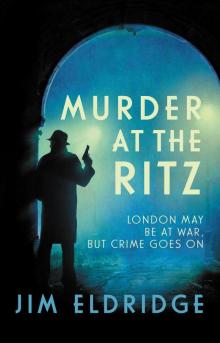 Murder at the Ritz
Murder at the Ritz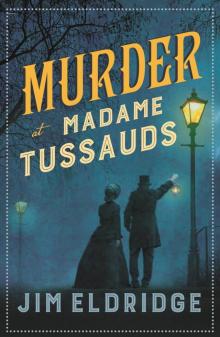 Murder at Madame Tussauds
Murder at Madame Tussauds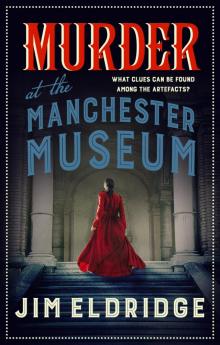 Murder at the Manchester Museum
Murder at the Manchester Museum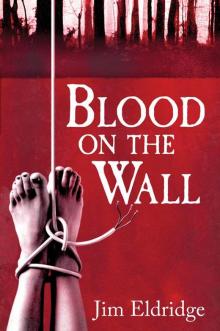 Blood On the Wall
Blood On the Wall 4.3.2.1
4.3.2.1 Jungle Kill (Black Ops)
Jungle Kill (Black Ops)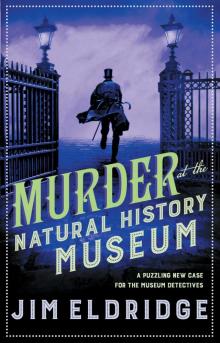 Murder at the Natural History Museum
Murder at the Natural History Museum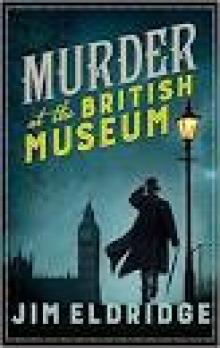 Murder at the British Museum
Murder at the British Museum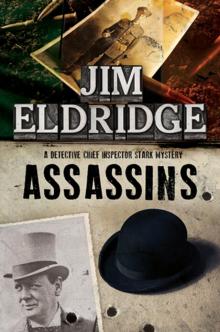 Assassins
Assassins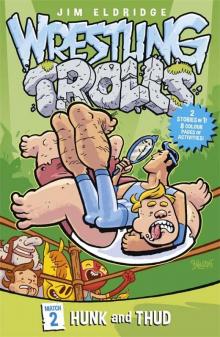 Hunk and Thud
Hunk and Thud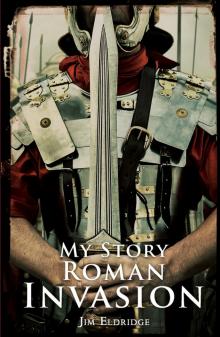 Roman Invasion
Roman Invasion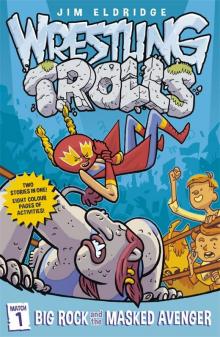 Big Rock and the Masked Avenger
Big Rock and the Masked Avenger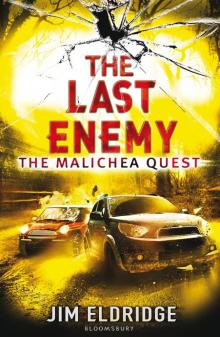 The Last Enemy
The Last Enemy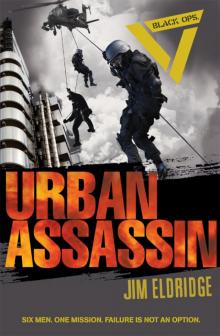 Urban Assassin
Urban Assassin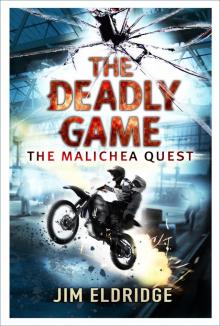 The Deadly Game
The Deadly Game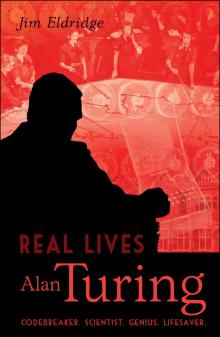 Alan Turing
Alan Turing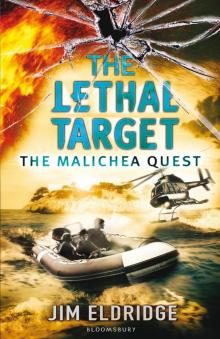 The Lethal Target
The Lethal Target The Giant Rumble
The Giant Rumble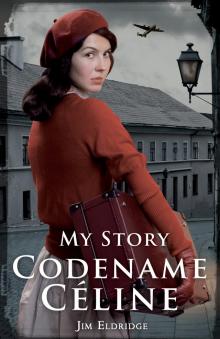 Codename Céline
Codename Céline Death in the Desert
Death in the Desert Escape from Pompeii
Escape from Pompeii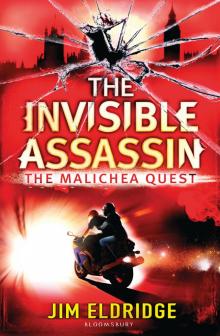 The Invisible Assassin
The Invisible Assassin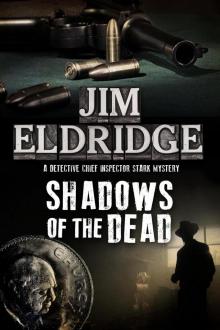 Shadows of the Dead
Shadows of the Dead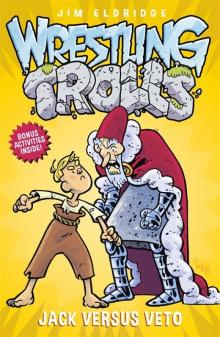 Jack Versus Veto
Jack Versus Veto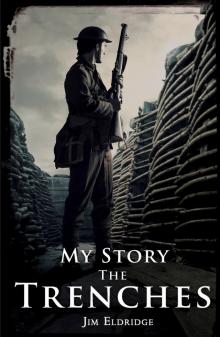 The Trenches
The Trenches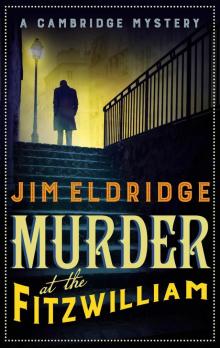 Murder at the Fitzwilliam
Murder at the Fitzwilliam Coming Home
Coming Home